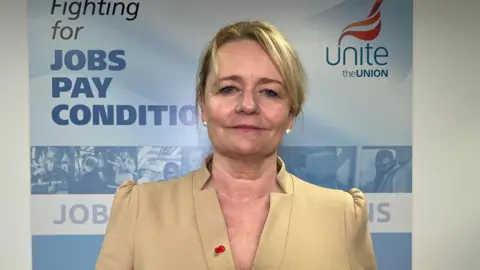Simon Jack,Business editor and
Michael Sheils McNamee,Business reporter
 PA Media
PA MediaBills for some of the country’s most intensive business energy users will be cut by £420m from next year, the government has said.
Speaking to the BBC, Business Secretary Peter Kyle said about 500 businesses in industries including steel, glass and cement would benefit from a 90% discount on their electricity network charges – up from 60%.
Unite’s secretary general Sharon Graham said she welcomed help with costs, but the amount saved would be “quite small” with profits in the energy sector “obscene” and in need of an overhaul.
It comes less than a month from the Budget, with the government facing questions about how it can unleash growth, while keeping its commitments on employment rights.
Last year, the UK’s energy costs were the highest in the G7 group of developed nations.
For the same year, the International Energy Agency reported that UK industrial energy costs were almost double the average across its members.
Speaking to the BBC at Encirc Glass in Chester, Peter Kyle said the funding was aimed at “levelling the playing field” with international competitors, and that the bill reduction would be paid for through existing government tax revenue.
“The savings we have made for it, we have targeted to make businesses like this more competitive, so therefore creating more jobs, more wealth, more revenue for our country,” he said.
The scheme is applicable across England, Wales, and Scotland, and some of the companies which will benefit from the change include Tata Steel at Port Talbot, and INEOS in the Scottish town of Grangemouth.
The reduction is on network costs, which are what businesses pay to access the UK’s electricity network, and make up about 20% of a company’s energy bill – meaning a 90% reduction works out at about 18% of the overall energy bill.
Reacting, UK Steel said the uplift in compensation was “greatly welcomed” – but that it would only mean a cut of 14 million for the beleaguered industry and firms wouldn’t see the benefit until payments were made in arrears in 2027.
“It is frustrating that the steel industry must face yet another year of uncompetitive electricity prices,” said UK Steel’s director general Gareth Stace.
‘It’s complete toffee’
Speaking to the BBC at Unite’s head office in London, its secretary general Sharon Graham said employers told her they were competitive on “every single measure”, with the exception of industrial energy costs.
Research carried out by Unite, which has more than 1.1 million members, found that £30bn in profit was made in the UK’s energy sector in 2024 – with industrial energy bills made up of about 29% energy company profits.
Its research also looked at the breakdown for domestic bills.
Roughly a third of what a household pays on energy bills in a year – about £500 – goes towards energy company profits, Graham said, urging the government to nationalise the industry.
This is a suggestion opponents criticise for its potentially enormous cost.
“You know, this argument that keeps coming up, ‘oh, it will take us down the road of Liz Truss’ – is just complete toffee,” said Ms Graham.
“The reality is, what Liz Truss did is that she borrowed for tax cuts for the rich, and she didn’t have a plan that she put before the OBR [Office for Budget Responsibility].”

‘More holes than Swiss cheese’
While the action on energy bills will provide some relief for heavy industry, there are broader concerns in the business community about the impact of the Employment Rights Bill.
One of Labour’s flagship policies, it is currently making its way through Parliament and would give workers certain rights from their first day of work.
These would include protection against unfair dismissal and the right to guaranteed hours – which businesses say could potentially make it riskier to hire someone.
The Federation of Small Business has said nine out of 10 of its members are worried about the bill, with two thirds saying they would recruit less staff in response to it.
Even the Resolution Foundation, the progressive think tank seen as having deep ties within the government, has cautioned the bill would “inhibit hiring” with “little obvious gain to workers”.
Peter Kyle said he did not see improved rights of workers as being “in contention with” the interests of business.
He said it would be implemented in a way that would contribute “towards the ability for businesses to make money by increasing productivity, by having workers that have security and rights that are fit for the age that we live in”.
However, he added he was “listening very closely” to employers and workers “to make sure there’s a probationary period that gets that balance right”.
For Sharon Graham, the legislation as it stands is “a burnt out shell”.
“I think I said at one point it had more holes than Swiss cheese,” she said.
“The reason that I said that, is that what looks good when you first look at it – and I’ve been a negotiator for 35 years, so I do look under the bonnet – fire and rehire [is] banned.
“But then what you realise that is, in most circumstances, if an employer said there was financial difficulty, if a council says there’s financial difficulty, then they can fire and rehire you.”

